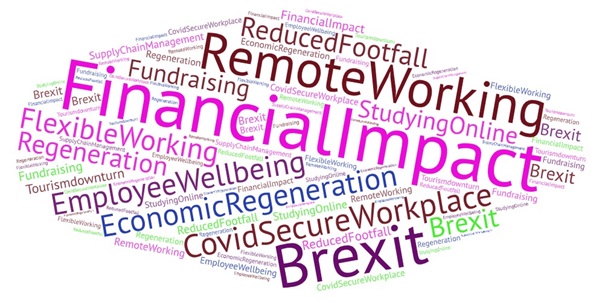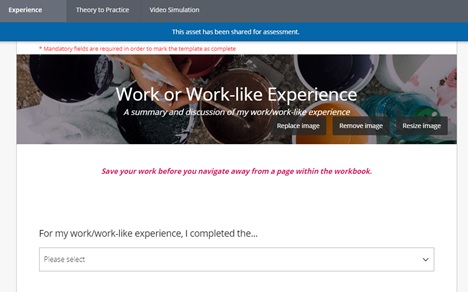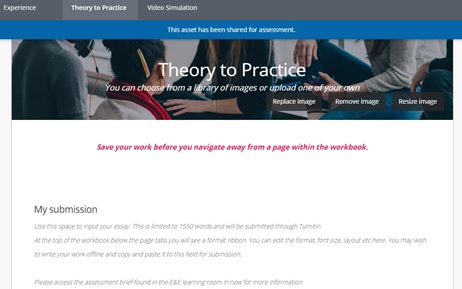Employment and Enterprise (E&E)
Assignment Brief
Business Consultancy Route – Employment and Enterprise E&E
The Employment and Enterprise module contains an experiential learning component, called ‘work or work-like experience’ (W/WLE). To satisfy this component, you must complete a minimum of 20 hours W/WLE between the 15th February 2021 and 28th April 2021.
The Business Consultancy Process
For your W/WLE you are required to adopt the role of a desk-based consultant and grapple with a critical issue of your choice. This will enable you to experience the challenge of working in a rapidly changing, non-standard work environment, in keeping with organisations of all shapes, sizes and forms who are continually adjusting to the shifting economic, social and cultural landscape. With this in mind, you are tasked with the following brief:
Identify and analyse a critical issue for an industry/sector/company/discipline of your choice and propose a strategic response.

You may look at any industry/sector/company/discipline, providing there is sufficient literature available. A good place to start is to identify a current issue under the Political, Economic, Social, Technological, Environmental, Legal and Industry (PESTELI) themes. You must be able to evidence your analysis and cite the sources of your research, drawing upon credible, professional sources. This may include websites/ organisations social media and/ or news outlets. Industry publications (Mintel etc) might also be a useful backdrop along with Government data. There should also be tangible links to the business discipline of your choice in order to draw upon your prior knowledge and gain relevant knowledge. The Business Consultancy Route Examples document provides some suggestions of the types of issues you could use for your consultancy challenge. These examples should not be a constraint but serve to stimulate your own ideas.
Key Stages in the Consultancy Process
It is anticipated that undertaking this consultancy role will take approximately 20 hours and at the end of this you will have the experience needed to produce your poster and write up your report.
- You will be invited to the launch of the Business Consultancy route (Wednesday 17th February 2021) which will give you more guidance as well as hearing from Business Consultants about how they approach their role and projects.
- You will need to research the sector/ organisation thoroughly to decide and define the scope of your consultancy. For some projects it might help to identify stakeholder groups. You will need to undertake some additional reading using existing literature and resources found online or conduct some stakeholder mapping i.e. an analysis of their existing stakeholders, donors and participants (again, only using secondary open-source material). DO NOT TALK TO THE ORGANISATION OR KEY STAKEHOLDERS: secondary research only.
- To guide your strategic response, you may choose to select some analytical tools which you have encountered in your studies to date (i.e. SWOT/ PESTELI/ Gap Analysis/ Stakeholder mapping/ Forcefield analysis etc/ scenario planning).
- Complete your Business Consultancy Design document and share it with your academic mentor for feedback in your seminar (w/c 1st March 2021).
- Continue to work on your project over the course of the term up to 28th April 2021 and develop your Poster and theory to practice section for the deadline of 17th May 2021 (11pm).
Links to Assessment
Poster

As part of your assessment for this module you must produce a poster that communicates the issue you have identified, provides an overview of your analysis and proposes your strategic response to the issue. This poster will include practical suggestions and recommendations for the organisation/ sector as well as an implementation strategy. This poster goes into the Experience page in PebblePad (see image above – choose other in this drop-down menu) (see Assessment guidance for more information).
Theory to Practice

This submission should discuss your experience of your W/WLE using relevant theory. This includes any of the theories introduced within the E&E module, or appropriate academic theory relative to your discipline/ area of interest.
More guidance on both assessment points can be found in the E&E NOW Learning Room under Assessment as well as being covered in the seminars.
The choice of your project is ultimately yours, however you should discuss this with your Academic Mentor. We have developed a Business Consultancy Design form for you to complete to allow you to scope your ideas out. Please share this with your academic mentor as part of Seminar 4.
Sample Answer
Business Consultancy Report
Employment and Enterprise (E&E) – Work/Work-Like Experience
Introduction
The Employment and Enterprise module requires the adoption of a consultancy role in order to explore and respond to a pressing organisational issue. This exercise replicates real-world consultancy practices, enabling students to experience how organisations adapt to rapidly changing environments. The purpose of this report is to identify and analyse a critical issue within a selected industry and to propose a viable strategic response. For this study, the focus will be on the retail sector, which has been profoundly impacted by the shift towards digitalisation, changing consumer expectations, and the long-term effects of the COVID-19 pandemic.
Identification of the Critical Issue
One of the most significant challenges currently facing the retail industry is digital transformation and the decline of traditional brick-and-mortar models. With the accelerated growth of e-commerce and the increasing dominance of online platforms such as Amazon, conventional retailers are under mounting pressure to adapt. Consumers now expect seamless omnichannel experiences, competitive pricing, and rapid delivery, while many physical stores face declining footfall and rising operational costs.
This issue is critical because it strikes at the very heart of retail operations: customer engagement, revenue generation, and long-term sustainability. Failure to respond effectively could result in large-scale redundancies, store closures, and brand erosion.
Analysis of the Critical Issue
The digital shift in retail can be analysed from several perspectives:
-
Economic Perspective: The financial burden of maintaining large store estates is increasingly difficult to justify as more transactions move online. Companies must reassess capital allocation to ensure resources are invested where they generate the greatest returns.
-
Social Perspective: Consumer behaviour is evolving rapidly. Younger demographics prefer online shopping, mobile-first engagement, and sustainable purchasing choices. Retailers that fail to align with these values risk losing customer loyalty.
-
Technological Perspective: The emergence of artificial intelligence, machine learning, and big data analytics provides both opportunities and threats. While technology can enhance customer experience through personalisation, it also demands significant investment and skills development, which many retailers lack.
-
Competitive Perspective: Established online giants have set a high standard in terms of price competitiveness, logistics efficiency, and user experience. Traditional retailers must find ways to differentiate themselves through niche offerings, community engagement, or premium experiences.
Strategic Response
In addressing this issue, a multi-faceted strategic response is required. A purely defensive approach, such as cost-cutting and store closures, may provide temporary relief but is not sustainable in the long run. Instead, the recommended response involves adopting an omnichannel retail model that integrates physical and digital platforms.
Continued...


